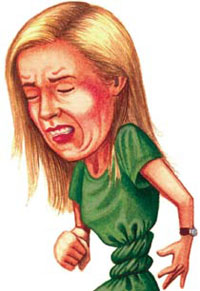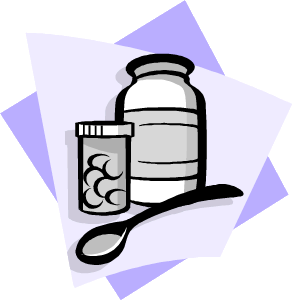|
Chronic Pelvic Pain:

What Is Chronic Pelvic Pain?
Chronic pelvic pain is pain in your pelvic region (the area below your
bellybutton and above your hips), that lasts 6 or more months. The pain may be a steady or it may come and go. It can feel
like a dull ache or it can be sharp. The pain may be mild or it may be bad enough to interfere with normal daily activities.
What Are Possible Causes Of Chronic Pelvic Pain?
- Endometriosis- Endometriosis is a problem with the lining of the
uterus. Tissue from the lining of the uterus moves through the fallopian tubes and gets on your ovaries, in your pelvis, on
your bladder or in other areas. When you have your period, this tissue swells and bleeds, just like the lining of your uterus.
This is often painful, and scar tissue can form in your pelvic area.
- Pelvic inflammatory disease (PID)- Pelvic inflammatory disease
is an infection in the female reproductive organs (uterus, fallopian tubes and ovaries). Normally, the cervix (opening to
the womb) prevents bacteria in the vagina from spreading up into these organs. However, if the cervix is exposed to a sexually
transmitted infection such as gonorrhea or chlamydia, it becomes infected. This can allow bacteria to travel up into
the internal organs, making them inflamed and infected. If this occurs, the woman's fallopian tubes may be damaged, making
it difficult for her to become pregnant.
- Fibroids- Fibroids are benign growths (not cancer) in the
muscular wall of the uterus. These growths can be very tiny or as large as a cantaloupe.
- Ovarian Remnant- During a complete hysterectomy, the uterus and
ovaries are removed. Sometimes a small piece of the ovary gets left behind, and that can develop painful cysts.

How Is Chronic Pelvic Pain Diagnosed?
A gynecologist will ask you questions about your past and present
health and about illness or health-related problems in your family. You may be asked to describe the kind of pain you have
where it is and how strong it is.
- Is the pain related to your menstrual cycle?
- Is it related to bowel movements?
- Does it hurt during urination or sexual activity?
- Have you had an infection?
- Have you had surgery in your pelvic area?
Extra tests may needed to be performed to help make the diagnosis.
How Is Chronic Pelvic Pain Treated?

Treatment depends on the individual problem. Your gynecologist will help you determine
which form of treatment is right for you. Some treatment options include:
- Stopping ovulation (release of eggs from the ovary) with birth control pills or Depo-Provera
injections. Use of nonsteroidal anti-inflammatory pain relievers such as Ibuprofen, Motrin and Aleve.
- Relaxtion
exercises, biofeedback (treatment to control emotional states using electrical devices) and physical therapy.
- Abdominal trigger point injections. A trigger point is a tender area in the lower
wall of the abdomen. Pressure that is put on this area causes pain. Injecting medicine into the trigger point can block this
pain.
- Antibiotics.
- Psychological counseling.
- Surgery is usually only an option if abnormalities in the pelvis are seen.
Dyspareunia (Pain During Intercourse):

What Is The Cause Of Dyspareunia?
- Tipped Or Retroverted Uterus -
Some women with a tipped uterus experience pain during intercourse. This happens when the penis hits the cervix or uterus
during sex. This condition is known as collision dyspareunia.
- Endometriosis -
The tissue lining the uterus(the endometrium) may grow outside the uterus causing deep pain during sex.
- Infection - Bacterial or yeast infections are among the most common
causes of pain during intercourse.
- Lack Of Estrogen - During menopause, the vaginal walls thin and
the amount of vaginal lubrication decreases.
- Vulvodynia - In this condition, the vulva is hypersensitive and
extremely tender on touch.
- Drug Side Effects - Common drugs including those for allergy, high
blood pressure or depression may affect the amount of vaginal lubrication, as well as the level of sexual arousal and desire.
- Physical Problems - Scar tissue from abdominal surgery or from
delivering a baby can distort the anatomy and cause significant pain during intercourse. A cyst on an ovary can also cause
pain.
- Pelvic Floor Myalgia - Pelvic floor muscle spasms are involuntary
muscle spasms and can result in difficult and uncomfortable sex.
- Emotional Issues - Sometimes, past issues such as sexual abuse
or communication problems in a relationship can translate into sexual difficulties.
How Is It Treated?

Your treatment depends on the cause of
the pain.
-
If you have an infection, your provider
will prescribe medicine for it.
-
If vaginal dryness is the cause, your
provider may recommend using a water-based lubricant every day or every time you have sex to decrease pain or discomfort.
Lubricants can be purchased at a drugstore.
-
During or after menopause, an estrogen
cream put on the vaginal area may help.
-
Kegel exercises and dilators of the
vagina can help vaginismus.
Depending on the cause, other possible treatments include counseling or
surgery.
|
